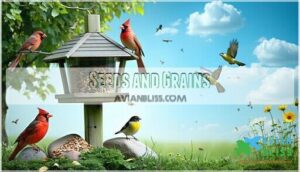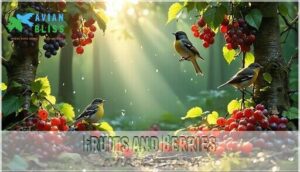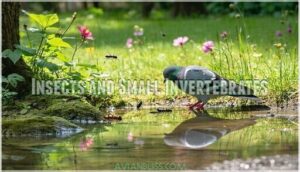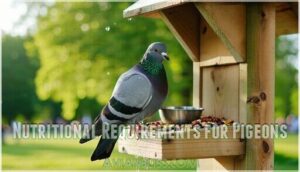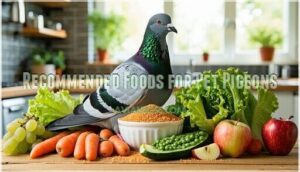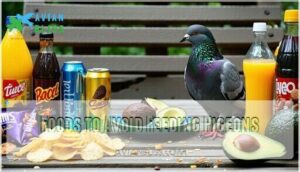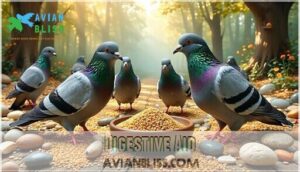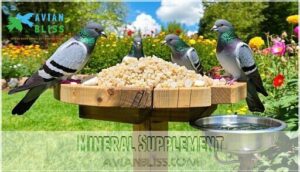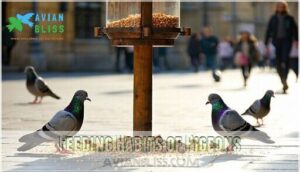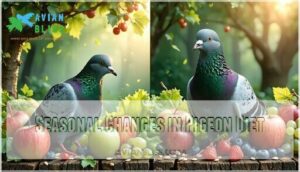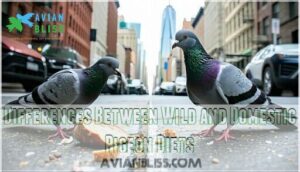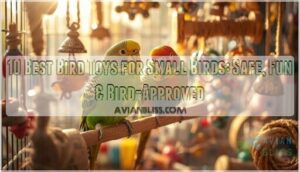This site is supported by our readers. We may earn a commission, at no cost to you, if you purchase through links.
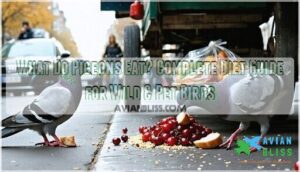
In the wild, they prefer seeds, grains, fruits, and berries.
Urban pigeons have adapted to city life, snacking on bread crumbs, food scraps, and whatever you drop on the sidewalk.
They’re like the neighborhood’s cleanup crew with wings.
These birds need protein from insects and small invertebrates, plus carbs from grains to fuel their daily flights around town.
Pet pigeons do best with commercial feed mixed with fresh vegetables.
Understanding their varied appetite explains why these adaptable birds thrive everywhere from forests to busy street corners.
Table Of Contents
- Key Takeaways
- What Do Pigeons Eat?
- Natural Diet of Wild Pigeons
- Urban Pigeon Diet
- Nutritional Requirements for Pigeons
- Recommended Foods for Pet Pigeons
- Foods to Avoid Feeding Pigeons
- Importance of Grit in Pigeon Diet
- Feeding Habits of Pigeons
- Seasonal Changes in Pigeon Diet
- Differences Between Wild and Domestic Pigeon Diets
- Impact of Diet on Pigeon Health
- Frequently Asked Questions (FAQs)
- Conclusion
Key Takeaways
- Wild pigeons eat seeds, grains, fruits, and insects naturally, while urban pigeons adapt to scavenging human food scraps like bread and fast food leftovers
- You should feed pet pigeons commercial feed mixed with fresh vegetables and avoid toxic foods like chocolate, avocado, onions, and high-salt processed snacks
- Pigeons need grit in their diet to grind food in their gizzards since they can’t chew, plus it provides essential minerals like calcium for bone health
- A balanced diet directly impacts your pigeon’s health – proper nutrition strengthens immunity and maintains glossy feathers, while junk food causes malnutrition and disease
What Do Pigeons Eat?
You’ve probably watched pigeons pecking around parks and wondered what they’re really after.
These adaptable birds showcase impressive dietary adaptations and foraging behavior, with food preferences ranging from seeds and grains to fruits and berries.
Wild pigeons demonstrate selective pigeon feeding habits, while urban birds adjust their pigeon food sources to include human scraps.
City pigeons adapt their diets while wild birds stick to nature’s menu.
Unlike mammals, baby pigeons receive pigeon milk from parents.
Understanding what pigeons eat reveals how their pigeon diet meets essential water needs and nutritional requirements for survival.
Natural Diet of Wild Pigeons
Wild pigeons eat a natural diet that includes seeds, grains, fruits, and occasional protein sources like insects.
You’ll find them foraging for items like millet, wheat, corn, berries, and small invertebrates in their natural habitats.
Seeds and Grains
Seeds and grains form the foundation of every pigeon’s diet, providing essential energy for daily activities.
You’ll find wild pigeons carefully selecting from nature’s buffet, choosing high-quality options that fuel their busy lives.
These birds prefer specific seed varieties that offer maximum nutrition:
- Millet seeds – small, easy to digest, and packed with carbohydrates
- Cracked corn – provides sustained energy throughout the day
- Wheat kernels – delivers protein and essential nutrients
- Sunflower seeds – offers healthy fats for feather maintenance
Wild seeds make up most of their natural intake, though sprouted grains become favorites during spring months.
Pigeons show strong preferences for organic seeds when available, avoiding chemically treated options.
Their pigeon feeding habits involve ground foraging and selective eating throughout daylight hours.
A quality pigeon seed mix mirrors this natural variety, while commercial pigeon food mix often lacks the grain quality found in nature.
Understanding pigeon diet basics helps you appreciate how these adaptable birds thrive on simple, nutritious seeds and grains across different environments and seasons.
Fruits and Berries
Beyond seeds and grains, you’ll find pigeons munching on nature’s candy.
Safe fruits like apples, grapes, and pears provide essential vitamins. Berries offer concentrated nutrition that supports healthy fruit digestion.
| Berry Benefits | Safe Fruits | Fruit Preparation |
|---|---|---|
| Antioxidant rich | Seedless apples | Small bite-sized pieces |
| Natural vitamins | Fresh grapes | Remove toxic pits |
| Easy digestion | Ripe berries | Wash thoroughly |
These colorful treats complement their pigeon diet perfectly. However, avoid toxic fruits like avocado. Proper fruit preparation guarantees your feathered friends get maximum berry benefits while staying safe.
Insects and Small Invertebrates
While seeds and grains make up most meals, wild pigeons occasionally eat insects and small invertebrates for extra Protein Source.
This Insect Variety supports their Foraging Behavior and provides important Nutritional Value, especially during breeding season when Seasonal Availability matters most.
To facilitate proper digestion, pigeons also require grit and minerals.
Pigeon eating habits include these common insects:
- Ants and beetles found while ground foraging
- Spiders discovered in crevices and corners
- Earthworms after rainfall softens soil
- Small snails hiding under leaves
- Caterpillars crawling on plants.
This diverse pigeon food helps balance their pigeon diet naturally.
Urban Pigeon Diet
Urban pigeons have adapted to city life by eating whatever they can find, from pizza crusts to dropped french fries.
You’ll see them pecking at bread crumbs, pastries, and handouts from people in parks, though this junk food diet often leads to health problems.
Human Food Scraps
Urban pigeons survive by scavenging human food scraps throughout cities.
City pigeons turn trash into treasure, surviving on whatever falls from human hands.
These opportunistic birds grab pizza crusts, french fries, and sandwich remnants from trash cans and sidewalks.
While this urban pigeon diet helps them survive in concrete jungles, it creates serious nutritional deficiencies.
Poor pigeon food sources lead to health problems and reduced lifespans.
These scavenging risks affect both birds and humans:
- Malnutrition weakens immune systems
- Obesity from high-fat foods pigeons eat
- Feather loss and poor plumage quality
- Increased disease transmission risks
- Digestive problems from processed foods
- Shorter lifespans compared to wild birds
- Public health concerns from sick populations
Urban adaptations show pigeons’ resilience, but proper pigeon feeding with seeds and grains creates healthier flocks with less dietary impact on communities.
Bread and Pastries
Walking past any city park, you’ll spot pigeons enthusiastically gobbling up bread and bakery items tossed their way.
While these processed human food scraps might seem like harmless snacks, they create serious nutritional deficiencies in urban pigeon populations.
Bread lacks essential proteins, vitamins, and minerals that foods pigeons eat naturally provide, leading to digestive problems and weakened immune systems.
These addictive qualities keep pigeons returning to the same feeding spots, creating urban dependency that disrupts their natural foraging behaviors.
White bread offers empty calories, while sugary pastries can cause metabolic issues.
This poor diet contributes to public health concerns as malnourished birds become more susceptible to disease.
Food Nutritional Value Effect on Pigeons
Park Handouts
You might think you’re helping when you toss breadcrumbs to park pigeons, but these handouts create bigger problems.
Urban pigeons quickly develop species dependency on human feeding, changing their natural pigeon feeding behavior and food choices.
- Handout Nutrition: Park snacks lack essential vitamins and minerals pigeons need
- Overfeeding Impact: More food means larger flocks and increased public health concerns
- Responsible Handouts: Choose seeds over processed foods for better pigeon preferences
Nutritional Requirements for Pigeons
Just like humans, pigeons need a balanced mix of proteins, carbohydrates, fats, vitamins, and minerals to stay healthy and strong.
Understanding these basic nutritional needs helps you provide the right foods whether you’re caring for pet pigeons or responsibly feeding wild ones, which is crucial for their overall health.
Proteins
Protein serves as your pigeon’s foundation for strong feathers, robust muscles, and healthy growth.
Adult birds need 13-20% dietary protein, with racing pigeons requiring higher levels during peak activity. Natural protein sources include insects like beetles and earthworms, plus amino acid-rich legumes such as peas, lentils, and vetch.
Commercial pigeon feeds often contain complete proteins that provide essential amino acids your bird can’t produce alone. Watch for protein deficiency signs like weak feather development, poor muscle tone, or reduced energy levels, which indicate you need protein-rich foods in their diet.
Pigeons rely on fat, not just protein, as primary fuel source during flight.
Carbohydrates
Carbohydrates serve as your pigeon’s primary energy source during flight and daily activities.
Seeds and grains like corn, wheat, and barley provide essential fuel, while their fiber content supports the digestion process.
A diverse grain variety prevents carbohydrate deficiency and maintains steady energy levels.
- Corn and wheat offer quick energy for active periods
- Cooked pasta and rice provide easily digestible carbohydrates
- Barley and oats deliver sustained energy throughout the day
Your pigeon diet should contain at least 60% carbohydrates for peak performance.
However, urban excess from processed foods can create nutritional imbalances, so stick to natural grain sources.
Fats
Dietary fats provide concentrated energy for your pigeon’s stamina and flight endurance.
You’ll find essential fatty acids in seed oils from sunflower seeds, flaxseeds, and hemp seeds. These healthy fats support proper fat digestion and energy storage.
However, balance is key – too much fat creates obesity risks that can harm your bird’s health. Racing pigeons need about 2.5-7% dietary fat for ideal performance.
During winter months, slightly higher fat content helps maintain energy reserves for staying warm. Meeting a pigeon’s species dietary needs is essential for their overall health.
Vitamins and Minerals
Vitamins and minerals act as your pigeon’s essential building blocks for ideal health.
These micronutrients prevent deficiency symptoms and support essential bodily functions through proper vitamin absorption from quality sources.
- Calcium and Vitamin D3 strengthen bones and improve eggshell quality
- B-complex vitamins boost energy metabolism and nervous system function
- Vitamin A maintains healthy vision and immune response
- Iron and zinc support blood formation and wound healing
Supplement types vary from powders to liquid forms with specific perfect dosage requirements.
Recommended Foods for Pet Pigeons
When you keep a pet pigeon, you’ll need to provide a balanced diet that includes commercial pigeon feed, fresh vegetables, and occasional fruits.
These foods give your bird the proper nutrition it needs to stay healthy and active throughout its life.
Commercial Pigeon Feed
When selecting commercial pigeon feed, you’ll find Feed Types ranging from basic seed mixes to nutritionally complete pigeon pellets.
Quality pigeon pellets contain 13.5-16% protein and provide balanced nutrition without selective feeding issues.
Commercial pigeon mixes blend grains like wheat, barley, and corn with protein sources such as peas and sunflower seeds.
These pigeon-specific feeds often include essential vitamins and minerals that basic pigeon seeds lack.
You can find various options for pigeon feed products online.
For ideal Ingredient Quality, choose dust-free, mold-free options from reputable brands.
Feeding Schedules work best with twice-daily portions or free-choice feeding when you provide constant grit access.
Your Supplement Needs decrease substantially with fortified pellets compared to plain grain mixes.
Cost Analysis shows pellets cost more upfront but reduce waste and supplement expenses.
Store feeds in airtight containers to maintain freshness and nutritional value.
Vegetables and Greens
Vegetables provide essential nutrition for your pigeon’s health and wellbeing.
These leafy green benefits include vitamins, minerals, and fiber that support strong immunity and digestion.
Choose these safe vegetables for ideal pigeon nutrition:
- Spinach – Rich in iron and vitamins
- Broccoli – Packed with vitamin C and antioxidants
- Carrots – High in beta-carotene for eye health
- Kale – Dense nutritional value with calcium
Chop vegetables into small pieces for easy consumption.
Fruits in Moderation
Fruits make great treats for your pigeon, but portion size matters in regard to fruit sugar content.
Choose safe fruit types like berries, seedless apples, grapes, and melons. These seasonal fruit choices boost your pigeon’s nutritional balance and add variety to their pigeon diet.
Use proper fruit preparation methods by chopping pieces small. Fruits and vegetables together create better pigeon food choices for ideal pigeon health.
Limit servings to prevent digestive issues from excess sugar.
Foods to Avoid Feeding Pigeons
Understanding what not to feed pigeons is just as important as knowing what they should eat, especially since many common foods can harm their health or even prove fatal.
You’ll want to avoid toxic items like chocolate, avocado, and caffeine, along with high-salt processed foods and sugary treats that can cause serious digestive problems.
Toxic Foods
Certain foods can poison pigeons and cause serious harm.
Chocolate toxicity from theobromine, avocado concerns due to persin, and caffeine effects make these dangerous foods off-limits for your bird.
- Chocolate – Contains theobromine causing heart problems and seizures
- Avocado – Persin toxin triggers respiratory distress and heart failure
- Onions/Garlic – Sulfur compounds damage blood cells and cause anemia
High-Salt Foods
Though you might think sharing your salty snacks shows kindness, high-salt foods pose serious health risks to pigeons.
Salt Toxicity occurs when pigeons consume chips, pretzels, or salted nuts because their kidneys can’t process excess sodium like humans can. This leads to Dehydration Risk and potential Kidney Damage that threatens their survival.
Your pigeon’s pigeon nutritional requirements don’t include processed salty foods that disrupt their pigeon health diet.
Instead, offer Dietary Alternatives like unsalted sunflower seeds or plain grains that support proper pigeon nutrition.
These Safe Treats satisfy their pigeon dietary needs without compromising their well-being, keeping your feathered friend healthy and hydrated.
Sugary Treats
Sweet snacks create serious digestive problems and obesity risks in your pigeon’s diet.
These processed foods lack essential nutrients, causing nutritional deficiencies that harm pigeon nutrition long-term.
Avoid these harmful foods:
- Chocolate – Toxic compound causes severe illness
- Candy – Pure sugar disrupts natural metabolism
- Sugary cereals – Empty calories replace necessary nutrients
- Ice cream – Unnatural sugars damage digestive system
- Sweet pastries – High-calorie treats alternatives needed
Choose healthy options instead.
Importance of Grit in Pigeon Diet
You need grit in your pigeon’s diet because these birds can’t digest hard seeds and grains without it.
Grit acts like tiny grinding stones in their gizzard, helping break down food while providing essential minerals like calcium for strong bones and healthy eggshells.
Digestive Aid
Pigeons break down tough seeds and grains using grit as their built-in food processor. Since they can’t chew, these small stones work in the gizzard to grind food into digestible pieces.
Without grit, you’ll notice watery droppings and poor digestion in your birds.
Wild pigeons naturally pick up tiny stones for shell digestion. Your pet pigeons need you to provide clean grit types regularly.
This indigestible fiber acts as an intestinal cleanser, keeping their digestive system running smoothly and preventing common digestive disorders. Providing the right pigeon digestive grit is essential for maintaining their overall health.
Mineral Supplement
Beyond breaking down food, grit serves as your pigeon’s mineral pharmacy. Soluble grit types like oyster shells and limestone dissolve in their system, delivering calcium carbonate and other nutrients directly where they’re needed.
Your bird’s Mineral Needs go beyond basic calcium. Quality pigeon supplements contain phosphorus, magnesium, and trace elements that support strong bones, healthy feathers, and successful breeding. Calcium Sources become especially important during egg-laying season when females need extra support.
Grit Importance extends to maintaining Dietary Balance. Different Supplement Types offer varying benefits:
- Mineral blocks provide slow-release nutrients
- Grit with calcium combines digestive aid with nutrition
- Calcium carbonate supports bone strength and egg production
Commercial pigeon nutritional balance products often blend multiple minerals with vitamins A, D3, and E. Red stone grit adds iron, while cuttlebone delivers pure calcium.
Watch your pigeons’ consumption patterns. They’ll naturally regulate intake based on their bodies’ needs, eating more during molting or breeding seasons when mineral demands peak. For maximal health, consider a pigeon mineral supplement to guarantee they receive all necessary nutrients.
Feeding Habits of Pigeons
If you’re curious about when and how much pigeons eat, you’ll find their feeding patterns are quite predictable and tied to their natural instincts.
These birds typically eat twice a day and consume about 30-40 grams of food daily, with peak feeding times occurring in the early morning and late afternoon.
Frequency
Regular feeding schedules keep pigeons healthy and happy.
Most pigeons do well with two to three meals per day at consistent times.
This routine helps their digestive system work properly and prevents overeating.
Here’s how to set up good meal times:
- Morning feeding – Start the day with their main meal around sunrise
- Afternoon portion – Offer a smaller meal in mid-afternoon
- Evening snack – Provide light feeding before sunset
Wild pigeons naturally eat throughout the day in small amounts.
Pet pigeons benefit from this same pattern.
Stick to regular meal times so your birds know when food is coming.
This reduces stress and keeps their consumption patterns steady.
Amount
How much food should you give your pigeon? Daily Intake depends on age and activity level. Portion Control prevents obesity and waste.
| Pigeon Type | Daily Amount |
|---|---|
| Adult | 30-40g |
| Young | 20-30g |
| Racing | Up to 60g |
| Pet | 35g average |
Split portions into two meals for better Nutrient Balance. Monitor your bird’s weight to adjust Food Quantity as needed. Understanding balanced bird nutrition is vital for maintaining healthy health in pigeons.
Time of Day
Your feathered friends follow predictable daily routines in regard to eating. Morning feeding starts their day as they search for seeds and grains. You’ll spot them most active during these early hours, taking advantage of cooler temperatures.
Noon foraging continues as they explore urban areas for food scraps. Their pigeon feeding schedule adapts to available light and weather conditions. Evening roost brings quieter meals before they settle down.
- Watch them gather in flocks during peak feeding times, creating quite the bustling scene.
These pigeon dietary habits show remarkable consistency across different environments and seasons, with a predictable daily routine that is influenced by their feeding schedule.
Seasonal Changes in Pigeon Diet
Pigeons change their eating habits with the seasons to match what’s available in nature.
You’ll notice they eat more fresh fruits and greens in spring and summer, then switch to higher-energy seeds and grains during fall and winter.
Spring and Summer Foods
During warm weather, pigeons shift their foraging to take advantage of nature’s bounty.
You’ll notice them seeking fresh fruits and seasonal berries that ripen in summer heat. Green leafy vegetables become prime targets as gardens flourish.
- Summer grains: Millet and cracked corn provide essential energy for active flight
- Fresh fruits: Apple slices and berries offer vitamins for breeding season health
- Leafy greens: Spinach and tender shoots supply nutrients for molting feathers
Fall and Winter Foods
During autumn, pigeons shift to high-fat foods like acorns and tree fruits.
Their pigeon winter diet features concentrated energy sources – nuts, cereals, and leftover crops. Winter feeding becomes essential as cold weather limits options.
Birds gain weight for survival, exploiting seasonal seeds and urban handouts when natural foods freeze. Pigeons require a balanced diet that includes natural bird food to maintain their overall health.
| Season | Primary Foods | Key Benefits |
|---|---|---|
| Fall | Acorns, tree fruits, harvest grains | Fat storage for winter survival |
| Early Winter | Nuts, conifer seeds, dried berries | Concentrated energy in harsh weather |
| Deep Winter | Winter grains, urban scraps, grit | Essential calories during snowy foraging |
| Late Winter | Frozen fruits, stored seeds, handouts | Sustenance until spring arrives |
| Transition | Mixed diet preparation | Building strength for breeding season |
Differences Between Wild and Domestic Pigeon Diets
Wild pigeons face the daily challenge of finding their next meal in nature’s buffet, while domestic pigeons enjoy carefully planned dining experiences.
You’ll discover that this fundamental difference in food access shapes everything from their nutritional health to their foraging behaviors.
Variety in Wild Diets
While wild pigeons roam freely, they develop remarkable pigeon dietary adaptations that showcase nature’s ingenuity.
These birds master natural forage techniques across diverse environments. Wild pigeon food varies dramatically based on location and season. Their pigeon diet in the wild demonstrates incredible flexibility as they locate available nutrition sources.
Wild diet diversity includes:
- Wild Seeds from grasses, weeds, and native plants
- Grain Sources like wheat, corn, and barley from agricultural areas
- Fresh Fruits including berries, small tree fruits, and fallen produce
- Insect Variety such as beetles, worms, and larvae for protein
This pigeon wild diet creates healthier, more resilient birds compared to their urban cousins who rely on processed human food scraps.
Controlled Nutrition in Captivity
When caring for captive pigeons, you’ll control every aspect of their nutrition through careful feed schedules and balanced meals.
Commercial pelleted diets provide complete pigeon nutrition, while fresh produce adds variety to your pigeon diet plan.
Essential pigeon supplements like grit aid digestion.
Your pigeon feeding tips should include clean water and vitamin additions.
This controlled approach guarantees consistent pigeon nutritional needs are met consistently.
Happy pigeons, happy pigeon lofts!
Food Type Benefits Cost
Impact of Diet on Pigeon Health
Diet directly affects every aspect of your pigeon’s health. Poor pigeon nutrition leads to serious health consequences that can shorten their lifespan and reduce quality of life.
A balanced diet prevents nutrient deficiency and supports strong immunity. When pigeons eat junk food or lack essential nutrients, malnutrition effects become visible quickly. You’ll notice dull feathers, lethargy, and increased illness.
Here’s how diet impacts pigeon health:
- Disease resistance – Proper nutrition strengthens immune systems against bacterial infections
- Physical condition – Essential nutrients maintain healthy feathers, bones, and organs
- Digestive health – Quality grains and grit prevent digestive issues and support metabolism
Pigeon obesity from high-fat foods causes liver problems and oxidative stress. Poor pigeon food safety practices spread disease in flocks. Your pigeon diet plan should focus on grains, seeds, and fresh water. Avoid bread and processed foods that lack nutrition. A well-fed pigeon shows bright eyes, glossy feathers, and active behavior. Understanding bird dietary needs is essential for creating a balanced and nutritious diet for your pigeons.
Frequently Asked Questions (FAQs)
What should a pet pigeon eat?
Feed your pet pigeon a mix of high-quality seeds, grains like millet and corn, plus fresh vegetables and fruits. Provide clean water daily and avoid bread, chocolate, or processed foods.
What do feral pigeons eat?
Feral pigeons scavenge whatever they can find in cities – bread crumbs, fast food scraps, pizza leftovers, and spilled bird seed. They’ve adapted to eat almost anything available.
What do Urban pigeons eat?
Picture a scavenger hunt in concrete jungles – urban pigeons eat whatever you drop.
They feast on bread crumbs, pizza scraps, french fries, and restaurant leftovers, adapting their natural seed-and-grain diet to city life’s abundant junk food opportunities, which includes eating junk food.
What seeds do pigeons eat?
You’ll find pigeons munching on millet, sunflower seeds, safflower, corn, wheat, barley, sorghum, rice, and flax. These hardy birds aren’t picky – they’ll grab whatever seeds you scatter their way.
Can pigeons eat food?
Yes, pigeons can eat food.
They’re natural seed and grain eaters who’ll munch on millet, corn, wheat, and barley.
They’ll also enjoy fresh fruits, vegetables, and commercial pigeon feeds for balanced nutrition.
What fruits do pigeons eat?
Birds of a feather flock together,"
and pigeons enjoy many fruits.
You can offer them berries, apple slices (no seeds), grapes, pears, melons, cherries, plums, and bananas.
Always provide fresh fruit in small pieces.
Can I feed wild pigeons?
You can feed wild pigeons grains like millet, wheat, and corn, plus chopped vegetables. Avoid bread and processed foods—they’re unhealthy. Feed small portions occasionally to prevent dependency and overcrowding.
What fruit do pigeons eat?
Pigeons enjoy apples, grapes, berries, pears, melons, cherries, plums, and bananas. You’ll want to remove seeds from apples since they’re toxic. Cut everything into small pieces for easy eating.
What should you not feed pigeons?
Like feeding poison to a friend, certain foods spell disaster for pigeons.
Never give them bread, chocolate, avocado, onions, garlic, caffeine, dairy, or processed snacks—these cause serious health problems or death.
What food attracts pigeons the most?
Seeds and grains work like magnets for pigeons. You’ll draw crowds with corn, millet, wheat, and sunflower seeds. They can’t resist these natural favorites that fuel their daily adventures.
Conclusion
Perfectly understanding what do pigeons eat helps you care for these adaptable birds properly.
Whether you’re feeding wild pigeons or keeping pet ones, their diet needs balance.
Seeds, grains, fruits, and protein from insects keep them healthy.
Urban pigeons survive on human food scraps, but fresh vegetables and commercial feed work better for pets.
Remember that proper nutrition directly impacts their health, energy levels, and overall well-being throughout different seasons.
- https://americanpestcontrol.com/youll-never-guess-what-pigeons-actually-eat-shocking-truths-about-pigeon-diets-and-care-revealed/
- https://www.sciencedirect.com/science/article/pii/0031938479902737
- https://www.birdwatchingdaily.com/beginners/birding-faq/what-do-pigeons-eat/
- https://www.pigeonrescue.org/birds/care/pigeon-feeding-dove-feeding/
- https://gladwellspet.co.uk/pigeon-feeding-guide/

